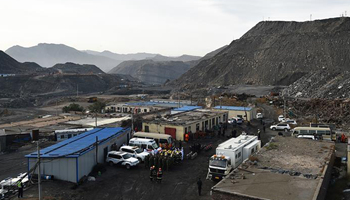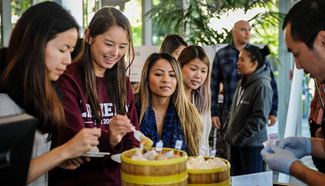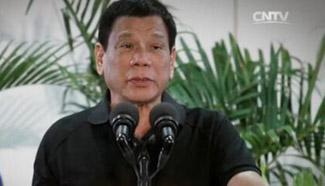BEIJING, Oct. 12 (Xinhua) -- The relationship between China and Cambodia, two Asian countries with a long-standing friendship fostered by the previous generations of leaders, has withstood the test of time and grown ever stronger.
The following are basic facts about China-Cambodia relations.
Modern relations between the two countries date back to 1955 when then Cambodian King Norodom Sihanouk met former Chinese Premier Zhou Enlai in Indonesia during the Asian-African Conference, also known as the Bandung Conference.
China's Five Principles of Peaceful Coexistence for handling national relations and recognition of the Cambodian people's struggle for independence won high appraisal from Sihanouk, resulting in the establishment of diplomatic ties in 1958 between the two countries.
On March 18, 1970, Sihanouk, on an official visit to the Soviet Union, was the victim of a Coup d'Etat in Phnom Penh. With China's support, Sihanouk became President of the Cambodian Resistance (FUNC- National United Front of Cambodia) a few days later in Beijing. In April, 1975, the People's National Liberation Army of the FUNC achieved a total victory in Cambodia.
At the end of 1978, the neighboring Vietnamese invaded Cambodia. Sihanouk was again forced to leave his motherland for China, where he led domestic forces to fight against the invaders for more than ten years. China, together with other peace-loving people in the world, unswervingly promoted the peace process in Cambodia until a final peace returned to the country.
After the Paris Peace Accord was signed in 1991 to end Cambodia's protracted civil war, China provided substantial assistance to the war-torn country to boost economic growth, such as building infrastructure.
The stretch of roads being built and to be built by Chinese corporations in Cambodia have amounted to 2600 km, occupying over 35 percent of the country's total. In addition, the Chinese side has built seven large-scale bridges, crossing the inland Tonle Sap River and the Mekong River which passes through several Asian countries before reaching the sea.
Enterprises from China have also set up six hydroelectric plants in Cambodia, representing about 50 percent of the total electricity available in the country. The 11 massive water conservancy facilities established by Chinese firms have provided irrigation to over 90,000 hectares of land in the south east Asian country.
On the Cambodian side, Sihanouk advocated for Beijing to have its seat restored at the United Nations in 1971. Today, Phnom Penh stands steadfastly with China in the disputed South China Sea issue.
Cambodia is "a good neighbor, like a brother" and "a good friend with sincerity," Chinese President Xi Jinping told visiting Cambodian King Norodom Sihamoni while they met in June in Beijing. They also pledged to consolidate their traditional friendship and further promote their comprehensive strategic cooperative partnership, an advanced level of bilateral relations.










